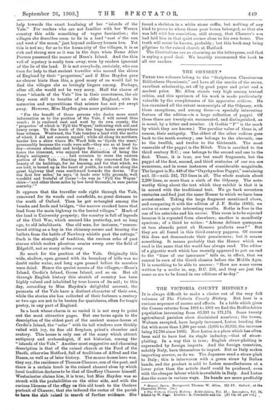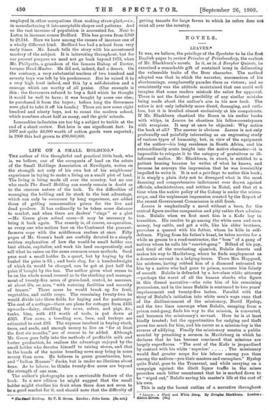THE VICTORIA COUNTY HISTORY.
IT is always difficult to make a choice out of the very full volumes of The Victoria County History. But here is a curious sequence of causes and effects. In a table which gives the Census returns from 1881 to 1901 we find the Bedfordshire population increasing from 63,393 to 171,174. Some twenty agricultural parishes show diminished numbers ; the towns, Woburn excepted, have largely increased, Luton heading the list with more than 1,200 per cent. (3,095 to 38,926, the increase being 12,786 since 1881). Now Luton is a place which has often been said to have lost its staple industry,—that of straw- plaiting. In a way this is true ; English straw-plaiting is superseded by foreign imports. And the foreign countries, notably Italy, have themselves to import. But as Italy makes importing answer, so do we. The Japanese send a straw-plait to Italy ; this is interwoven with a green straw by Italian hands, and the product is sold to Luton manufacturers at a lower price than the article itself could be produced, oven with the cheaper labour which is available in Italy. And Luton does the same in various ways. Its hands are more profitably •
• Homeri Opera. Heeognorit Thomas W. Allen. IIT-IV. Oxford : at the Clarendon Press. [as.]
t The Victoria County History: Bedfordshire, rot. If. ; Lancashire. Vol. H. Edited by W. Page. London : A. Constable and Co. LZi lie, sd. per rolj
.1
employed in other occupations than making straw-plait,—i.e., in manufacturing it into acceptable shapes and patterns. And so the vast increase of population is accounted for. Next to Luton in increase comes Bedford. This has grown from 3,948 to 29,144. Here we have among the causes of increase one of a wholly different kind. Bedford has had a school from very early times. Mr. Leach tells the story with his accustomed mastery of the subject. It is interesting.throughout, but for our present purpose we need not go back beyond 1873, when Mr. Phillpotts, a grandson of the famous Bishop of Exeter, became Head-Master. He did not, indeed, find a desert. On the contrary, a very substantial nucleus of two hundred and seventy boys was left by his predecessor. But he raised it to a very high level indeed, and this by a self-devotion and a courage which are worthy of all praise. (One example is this : the Governors refused to buy a field which he thought it would be well to have; it was bought by some one else; he purchased it from the buyer ; before long the Governors were glad to take it off his hands.) There are now some eight hundred and ninety boys, not to count the modern school, which numbers about half as many, and the girls' schools.
Lancashire industries are too big a subject to tackle at the end of a short review. But here is one significant fact. In 1697 not quite £6,000 worth of cotton goods were exported; in 1900 this had grown to £90,000,000.











































 Previous page
Previous page